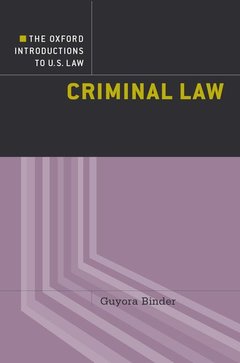Description
Criminal Law
Oxford Introductions to U.S. Law Series
Author: Binder Guyora
Language: English
Publication date: 08-2016
424 p. · 23.4x15.5 cm · Paperback
424 p. · 23.4x15.5 cm · Paperback
Description
/li>Biography
/li>
Many controversies in American criminal law reflect the tension between older and newer conceptions of the purposes of punishment. The English common law of crimes was centrally concerned with suppressing vengeance and asserting royal authority. Thus it enforced a royal peace by conditioning punishment on unauthorized force and harm to particular victims. The development of American criminal law has been the story of the emergence of this utilitarianism of criminal offending as the imposition of risk or the violation of consent, combined with culpability. This conception is reflected in the Model Penal Code and many state codes. Yet understanding contemporary criminal law requires that we also remember the model of offending as trespass against sovereignty out of which it emerged. In The Oxford Introductions to U.S. Law: Criminal Law, Guyora Binder reviews the development of American criminal law and explains its key concepts and persistent controversies in light of its history. These key concepts include retribution and prevention as purposes of punishment; the requirements of a criminal act and a culpable mental state; criteria of causal responsibility; modes of violating consent; doctrines of attribution of liability for incomplete offenses, including attempt, conspiracy and complicity; and defenses of justification and excuse.
Guyora Binder is Distinguished Professor, Hodgson Russ Faculty Scholar, and Vice Dean for Research and Faculty Development at SUNY Buffalo Law School. He was previously a law clerk to federal Judge Jack B. Weinstein, Leah Kaplan Visiting Professor of Human Rights at Stanford, and a visiting professor at the law schools of the University of Michigan, Georgetown University, and Vanderbilt University. Professor Binder authored Treaty Conflict and Political Contradiction (1988), and Felony Murder (2012), and he was a co-author of Criminal Law (1996, 2000, 2004, 2008, 2012, 2016), and Literary Criticisms of Law (2000). His articles have appeared in the Yale Law Journal, University of Chicago Law Review, Stanford Law Review, Texas Law Review, Michigan Law Review, Georgetown Law Journal, Boston University Law Review, Notre Dame Law Review, Cardozo Law Review, University of Toronto Law Review, and the Yale Journal of Law and Humanities.
© 2024 LAVOISIER S.A.S.




